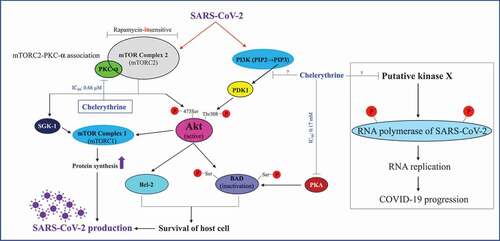Figures & data
Figure 1. Proposed mechanism of SARS-CoV-2 action and its inhibition by chelerythrine. mTORC2-dependent, mTORC1-mediated protein synthesis as well as mTORC2/PI3K-PDK1-dependent Akt activation and the resulting promotion of cell survival is the basic prerequisite for the synthesis of viral proteins and replication of its genome by the host cell biosynthetic machinery . Therefore, the inhibition of various enzymes of the host cell involved in virus production is an adequate means to stop these processes. Chelerythrine as a specific inhibitor of the protein kinases C alpha and beta (PKC-α/-β) can play an elementary role to accomplish this task. Furthermore, chelerythrine could directly inhibit the upstream kinase of the RNA polymerase of SARS-CoV-2, thus causing its inactivation

